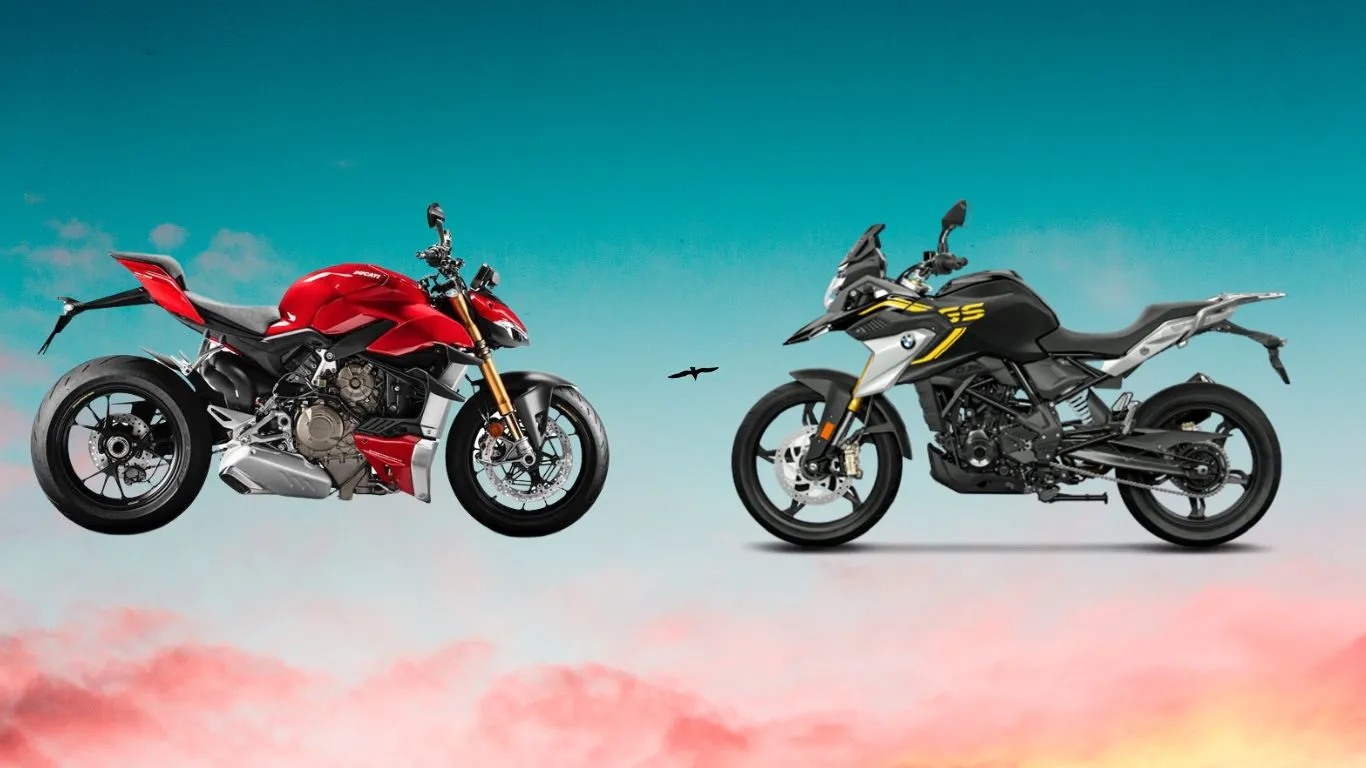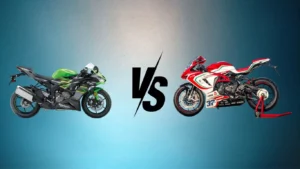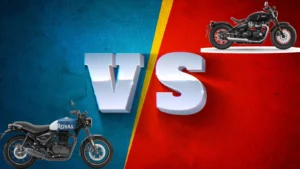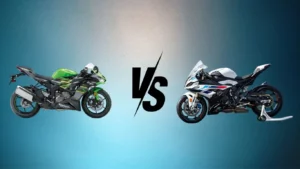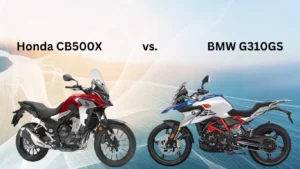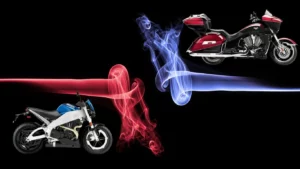Let’s start exploring the impeccable world of BMW and Ducati motorcycles. These two European brands, respected worldwide, bear their own distinctive strengths and weaknesses that make them unique in the motorcycling industry. Delving into the specifics, you will uncover interesting factors that may influence your next bike choice.
BMW, synonymous with unparalleled innovation and reliability, offers bikes that often come furnished with cutting-edge features like ABS, electronic suspensions, and multi-mode engine mappings. Nevertheless, their premium pricing can be a setback for many enthusiasts. On the contrary, Ducati is renowned for its racetrack-bred power and agility, offering adrenaline-pumping performance. However, their bikes may be seen as less comfortable for prolonged journeys and routine commuting. Selecting between them is, therefore, a matter of balancing your preferences
The Battle Begins: BMW vs. Ducati
Get ready for a thrilling ride, as we delve into the heart of two of the most venerated motorcycle brands from Europe: BMW and Ducati. Both highly respected for their design, performance, and reliability, they indeed stand tall in the motorcycle world. Grappling with the decision to choose between the two? Worry not, we’re here to shed light on their strengths, weaknesses, and distinctive qualities.
Eminent Engineering
The German heavyweight, BMW, steals the spotlight with its stellar engineering, fueling the manufacture of motorcycles renowned worldwide for their quality, reliability, and exceptional performance. With innovations like Einzylinder and Kompresser models, BMW never ceases to amaze motorcycle enthusiasts.
Italian stalwart, Ducati, on the other hand, provides a captivating blend of engineering prowess and design aesthetics. Home to models like the Panigale V4, Ducati motorcycles bristle with a combination of technological sophistication and category-leading performance.
The Style Standoff
Every BMW motorcycle stands as a testament to the brand’s relentless pursuit of elegant design and comfort. Aesthetically pleasing and functional, their motorcycles balance perfectly between style and practicality.
Ducati, by contrast, builds motorcycles as much for the eyes as for the road. The brand’s design philosophy orbits around three elements – style, sophistication, and performance. As a result, be it sport, touring, or standard, each Ducati motorcycle oozes Italian flair.
Riding the Reliability Road
BMW motorcycles have a well-earned reputation for reliability. With robust engine designs and consistent performance over the years, you’ll find their bikes are synonymous with longevity.
Ducati’s reputation, while speckled with occasional hiccups, has shown considerable improvement in the last decade. This rise in reliability aligns with Ducati’s commitment to perfecting their technological advancements.
Performance Programming
When it comes to picking a performance king between BMW and Ducati, it’s a close call. BMW motorcycles’ designs aim for comfort and a smooth ride at high speeds. This makes them an excellent choice for those planning long road trips.
Ducati, on the other hand, focuses more on raw speed and agility. If you’re looking for a thrilling ride and fierce acceleration, a Ducati may be more your speed.
1. Engineering Excellence: A Look Under the Hood
Let’s dig deep into the engineering traits that differentiate BMW and Ducati motorcycles. Both possess a rich history of producing top-tier motorcycles and have distinct engineering approaches worth considering. Here, we examine their distinctive strengths and how they cater to different types of riders.
BMW’s Balanced Approach
BMW is renowned for its methodical balance between performance and comfort. It focuses on constructing motorcycles that are smooth and easy to handle for long periods. The integration of advanced technology in its designs, such as telelever front suspension and paralever rear suspension, ensures a ride that is both steady and stable.
Ducati’s Racing Roots
On the other end of the spectrum, Ducati’s approach is rooted in racing. With a strong presence in MotoGP and World Superbike circuits, Ducati transfers its racing technology into its production bikes, resulting in motorcycles that are high in horsepower and performance. Desmodromic valve control, for instance, is a unique Ducati feature that offers precision and performance.
Customization Capabilities
Where BMW steals the show is through its customization offerings. Their extensive selection of customization options, such as choice in power, suspension, and seat height, allows riders to tailor a bike specifically to their needs.
Italian Flair
Ducati, however, dazzles with its Italian engineering flair, leading to motorcycles that are sporty and aesthetically appealing. Coupled with aggressive performance, it appeals to riders seeking thrill and style in one package.
2. Power and Performance: Who Comes Out on Top?
When it comes to power and performance, both BMW and Ducati have impressive offerings. The racy, adrenaline-pumping character of Ducatis contrasts sharply with the balanced, almost mature persona of BMW motorcycles. But who exactly takes the crown in this vital category? Let’s explore.
BMW: The Power of Precision
BMW motorcycles are known for their precision engineering. Their bikes are often seen as the epitome of performance and stability. These are motorcycles designed for those who want power but also require a machine that is predictable and easy-to-handle. This is primarily due to their boxer engines and sophisticated electronics. However, some riders might feel that BMW errs on the side of caution, possibly sacrificing sheer exhilaration for stability.
Ducati: Unleashed Performance
Ducati, on the other hand, is a brand that inherently leans towards racing. Their products offer unbridled performance, making them a popular choice amongst those who crave acceleration and speed. Ducatis are exhilarating, to say the least, but they can also be intimidating for the uninitiated. Their power comes from the mighty L-twin engines and the use of advanced materials like titanium and carbon fiber. The Scrambler range, however, offers a more approachable way for riders to experience Ducati performance.
The Verdict: It’s a Tie!
Between BMW’s precise, predictable power, and Ducati’s raw, racing-inspired performance, it’s hard to draw a definitive line on which brand offers better performance. Both provide exhilarating experiences, just in different ways. For a rider who enjoys controlled performance and touring, BMW may be the preferable choice. For those who long for the thrill of pure speed and aggression, Ducatie could be the king. Ultimately, it depends on the individual rider’s personal preferences in motorcycling.
Also Read:
- Honda Motorcycle vs Harley Davidson: Major Difference Explained
- Honda vs KTM: 8 Most Important Differences Explained
3. Unparalleled Design: Aesthetics and Style Compared
When considering the aesthetics and design of a motorcycle, the BMW and Ducati brands both stand out in delivering unique artistic marvels. Although they both excel in providing high-functioning machines, their approach to design drastically differs. This divergence arises from the brands’ history, their target audience, and the design philosophies unique to their country of origin. Let’s delve deep into understanding and comparing the unparalleled design of these two esteemed brands.
BMW: Industrial Chic
BMW takes a pragmatic approach imbued with sophistication; the result is an industrial chic design that’s both functional and appealing. The brand’s designs are neat and assertive, displaying a no-nonsense attitude towards motorcycle design. Characterized by the brand’s signature blue and white hues, every curve and angle of a BMW motorcycle screams of precision engineering and careful thought.
Ducati: Art On Wheels
Ducati motorcycles, on the other hand, can be described as a work of art in motion. Their masterfully curved and radiant exterior effortlessly catches the eye, a testament to the brand’s Italian heritage. Ducati’s design philosophy places high importance on aesthetics, leading to machines that are aesthetically pleasing without compromising on performance.
Comfort Comparison: Rider’s Delight
BMW shines in the arena of rider comfort. Their designs accommodate riders of all sizes, and the seating position is generally relaxed, promoting longer rides. Ducati, with their sportier design, delivers a more aggressive riding position which, although exhilarating, can be tiring for long-distance travel.
The Final Touch: Customization and Personality
Both BMW and Ducati offer a degree of customization to make your motorcycle feel uniquely yours. BMW has a wide variety of accessories and custom options to cater to all rider’s preferences. Ducati, on the other hand, has a more artistic approach to custom options, allowing for personalized color schemes and exclusive accessories that highlight the rider’s personality.
4. Rider Experience: Comfort and Ergonomics
When deciding between a BMW or a Ducati, one should not just consider their engine performance or visual aesthetics. The comfort and ergonomics of these motorcycles play a crucial role in the riding experience. Your physical interaction with the motorcycle, the comfort you feel while riding, and how it fits your body and riding style are immensely important. Now let’s delve into this comparison.
BMW: The Master of Ergonomics
BMW has always been known for outstanding comfort and excellent ergonomics on all their models. The seating position is carefully designed to offer ample support, reducing rider fatigue during long trips. The handlebars and footrests are also ergonomically placed to ensure optimal comfort on both local and long rides. Furthermore, BMW motorcycles come with adjustable suspensions, allowing for tweaks to improve handling and comfort based on the rider’s preference.
Ducati: Racing Comfort
While Ducati’s sport bikes are designed with a forward-leaning riding position to enhance maneuverability at higher speeds, they also take comfort into account. Ducati seats are known for their firmness and support, which prove beneficial during hard riding or racing scenarios. Moreover, models like the Multistrada family offer a relaxed upright seating position, high handlebars, and adjustable footpegs, thus providing comfort for longer journeys.
Comfort Features: Heating and More
Both BMW and Ducati offer advanced comfort features on select models. BMW is credited with heated grips and seats to keep you comfortable on chilly rides. Ducati, on the other hand, has introduced backlit handlebar controls and a hands-free system to make riding as comfortable and easy as possible.
Rider’s Delight: Gusto VS Scrambler
Compare the ergonomics of two specific models for clarity. On BMW’s side, we have the R 1250 GS Adventure, known for its royal comfort, and from Ducati, we have the Scrambler, a model celebrated for its comfortable riding experience. While the R 1250 GS Adventure boasts of long-distance comfort due to its excellent seating and adjustable suspension, the Ducati Scrambler offers a more city-friendly ergonomics with its upright seating, wide handlebar and lower seat height.
5. Technology at Its Best: Innovations and Features
For a motorcycle enthusiast, technological features can offer enhanced ride quality, safety, and convenience. BMW and Ducati, both being top-tier motorcycle brands, have incorporated numerous impressive technological innovations and features in their bikes that stand them out from the crowd. From rider-assist features to digital enhancements, these tech-packed beasts ensure optimal performance and exemplary rider experience.
BMW: A Symphony of Technology
BMW has always been one step ahead in terms of technology. Their motorcycles are packed with excellent features such as a gear shift assistant, electronic suspension, and a multi-controller for infotainment system. This translates to seamless gear changes, excellent ride comfort, and an interactive riding experience.
Ducati: The Technological Maverick
Ducati doesn’t hold back when it comes to technology either. Known for their ingenuity, Ducatis come equipped with features like riding mode selector, Ducati Quick Shift (DQS), and Ducati Traction Control (DTC), bringing about a sense of command and confidence to the rider. They ensure total control and comfort no matter the situation.
Focusing on Safety
Safety is a significant concern for every rider and BMW and Ducati have gone lengths to incorporate advanced safety features in their motorcycles. BMW’s Dynamic Traction Control and Automatic Stability Control are features that keep the rider safe from unforeseen road conditions. Similarly, Ducati’s Cornering ABS provides enhanced safety during sharp turns and bends.
The Digital Era: Connectivity and Convenience
In this digital era, connectivity features hold a special place in the motorcycle world. BMW’s Connectivity system offers riders an advanced solution for navigation, receiving calls, and music control. Ducati isn’t far behind with its Ducati Multimedia System, Keeping riders connected on the go.
6. Off-Road Adventures: BMW and Ducati’s Adventure Bikes
Let’s now delve into the realm of off-road prowess, a discipline where both BMW and Ducati have made their distinct marks. Venture bikes from these esteemed makers are masterpieces, each brimming with impeccable engineering, innovative features, robust performance, and captivating aesthetics. From gnarly trails to high mountain passes, they are truly built to conquer all terrains. Yet, they diverge in their approach to adventure, offering different charms to their riders.
BMW: Embracing the Wild
BMW’s adventure line-up, led by the famed R 1250 GS, is made for those who thirst for the unexplored. Its bikes offer a balance of power and comfort, ready to take on grueling terrains without taxing the rider. Off-road features like Enduro mode and Dynamic ESA elevate the experience, adapting the bike’s performance to the terrain. Furthermore, BMW’s optional off-road tires and protective elements fortify these machines for wilderness.
Ducati: The Artful Adventurer
Championing adventure in the Italian way, Ducati’s Multistrada series breathes life into the journey. It’s not about just surviving the trail; it’s about living it. Multistrada’s advanced Skyhook suspension and Enduro mode make these tracks feel like playgrounds. Ducati’s unique aesthetic approach, coupled with the thrilling V-twin rumble, makes adventure riding an art form.
Staying Connected on the Adventure
Technology has enhanced the off-road experience and both BMW and Ducati cater to this trend. BMW’s TFT display with BMW Motorrad connected app allows riders to navigate and stay updated effortlessly on off-road adventures. Comparatively, Ducati grants riders the same luxury with its Ducati Link App and TFT color display.
The Off-road Verdict
To pore over the details and decide one superior would be an injustice to these masters storytellers of off-road tales. Each offers a different narrative to adventure, and appeal varies with riders – some might fall for BMW’s linear, unstated off-road prowess, while others might get taken by Ducati’s vivacious approach. After all, the spirit of adventure is as diverse as the riders who embrace it.
7. Track Dominance: The Racing Heritage of BMW and Ducati
BMW and Ducati are not just famous for their road bikes, but also for their illustrious heritage in motorcycle racing. These brands have shown their prowess on the racing tracks, etching their names in the annals of racing history. Their high-speed monsters on two wheels manifest the companies extent of engineering expertise and innovative technology, often making them the unbeatable titans on the tracks.
BMW: A Legacy on Wheels
Bavarian Motor Works, or BMW, has brought numerous laurels in off-road and circuit racing. The brand’s flagship S1000RR has been a game-changer, taking BMW to the World Superbike Championships, often showing the top-tier motorcycles a thing or two. Furthermore, BMW’s R series has also been phenomenal in off-road races, particularly the Dakar Rally. This racing background greatly influences the tech and design elements of their commercial motorcycles.
Ducati: The Track Titan
Ducati’s name has become synonymous with MotoGP Championships. The brand’s fascination for speed and performance can be traced back to their Desmodromic valves, allowing them to achieve high RPM without valve float. Their bikes, like the Panigale V4R, bear testimonial to their racing pedigree. Ducati’s commitment to racing has cultivated their keen interest in aerodynamics and weight reduction which is reflected in their production models.
A Tale of Two Tracks
While both BMW and Ducati have their favorite hunting grounds, BMW often excels in endurance and off-road races, courtesy of their robust and reliable machines. On the other hand, Ducati’s flare dominates the track races with their lightning-fast and featherweight sport bikes. Both brands have traded victories and have shared moments of glory on various podiums around the world.
The Race-Influenced Offerings
For enthusiasts who crave the thrill of the track, both BMW and Ducati offer race-influenced models in their line-ups. BMW’s “HP” (High Performance) and Ducati’s “R” series, inspired from their winning race machines, bring the adrenal rush of a MotoGP bike to a common rider. Their racing pedigree is then used to fine-tune the performance and handling dynamics of their mass-market bikes, giving a feel of the racetrack on everyday rides.
8. Reliability and Maintenance: Keeping Your Bike on the Road
Motorcycles are investments, and like any investment, you want it to last. The reliability and maintenance of a bike play critical roles in its lifespan. So how do BMW and Ducati stack up in these critical areas? Let’s delve into the nitty-gritty and discover if either of these brands has the edge when it comes to keeping your bike on the road longer.
BMW: The Dependable Choice
BMW motorcycles are often seen as the embodiment of reliability. Meticulously crafted with high-quality components, they are built to stand the test of time. While maintenance can be costly due to proprietary parts, the frequency of repairs is typically lower than most. BMW also offers comprehensive warranties and excellent customer service, making its maintenance a relatively fuss-free affair.
Ducati: Spirited, with a Cost
Ducati’s bikes are about passion and performance. However, this spirit comes with high-maintenance requirements. Regular and rigorous maintenance checks are a must to keep the Ducati machine purring. Despite the relatively higher need for tune-ups, many owners feel it’s a small price to pay for the exhilarating riding experience.
Cost of Ownership: Initial Vs Long-term
When it comes to cost, there is a marked difference between the two brands. While a BMW bike may have a higher initial payment, its lower maintenance frequency can reduce long-term expenses. On the other hand, a Ducati might come in cheaper initially but could end up costing more in maintenance over a period.
Resale Value: The Final Consideration
Every owner must consider resale value, where BMW often shines due to its renowned durability and reliability. Ducati motorcycles too hold their value relatively well considering their iconic status and racing heritage. However, high-mileage Ducati bikes may face more depreciation due to perceptions of high maintenance needs.
9. Price Points: Luxury vs. Value
When it comes to deciding between BMW and Ducati, the price often plays a pivotal role. Both brands are champions in their own right, offering premium motorcycles that are a blend of aesthetics, performance, and superior engineering. However, how do they stack up when we uncork the bottle of luxury versus value debate? Let’s delve deeper.
BMW: The Crown of Luxury
Embodied in the prestigious brand of BMW, luxury becomes tangible. Owning a BMW motorcycle is not just about the pride of ownership. It’s about indulging in a world-class riding experience where every detail is thoughtfully designed. However, this badge of luxury comes at a price. BMW motorcycles are typically priced in the upper echelon of the market, a detail that favor those ready to pay for top quality.
Ducati: The Essence of Value
Ducati stands out as the brand that offers unsurpassed value. Their motorcycles are engineered to deliver a spectacular performance coupled with an aesthetically appealing design – all at a competitive price. While Ducatis often bear a higher price tag than their Asian counterparts, they offer an unrivaled blend of style, power, and Italian workmanship, positioning them as a value-rich choice in the premium motorcycle sector.
Comparing Cost-to-Performance Ratios
The balance between overall cost and performance is another major point to ponder. BMW’s offer meticulous German engineering and sophisticated features that justify the price tag, whereas Ducatis, with their racing DNA and superior agility, give true value for each dollar spent, especially regarding performance.
Ownership Costs: Beyond the Buy
Price isn’t just about the initial payment. It’s important to weigh the total cost of ownership. BMW motorcycles have garnered a reputation for low-maintenance costs and excellent warranty terms, delivering value down the line. In contrast, Ducatis are known for higher maintenance costs, though these are often offset by the high resale value these Italian beauties command.
10. Brand Loyalty: The Cult Following of BMW and Ducati
brand loyalty is a significant aspect. Both BMW and Ducati boast a dedicated fan base, willing to vouch for their favorites like devout followers of a cult. These loyalists are not just driven by the motorcycles’ capabilities or aesthetics, but it’s the collective heritage, ownership experience, and exclusive communities that often translate into this undying loyalty.
The Beemer Brotherhood
BMW, often affectionately referred to as ‘Beemers’ by their fans, have cultivated a sense of trust and admiration over the years. The brand offers opportunities for riders to connect, bond, and share their passion through their BMW Motorrad Club. These efforts have helped BMW foster a porous and inclusive community that feels more like a brotherhood.
Desmodromic Disciples
On the other hand, Ducati, known for its Desmodromic valve technology, inspires a fervent following of ‘Desmo’ die-hards, connecting deeply with their racing heritage. Be it the Ducati Owner Clubs worldwide or the famous World Ducati Week, the vibrant Italian brand is known to keep the essence of community spirit alive, creating a kinship among Ducati riders.
The Tie that Binds: Shared Experiences
Regardless of the brand of choice, shared experiences often bind these motorcycling communities together. Group rides, mechanic workshops, motor-shows, and race meets are social activities that ensure these communities are more than just about motorcycles but form enduring ties of camaraderie and shared passion among riders.
The Role of Merchandise
Both BMW and Ducati have also capitalized on their following by offering brand-centric merchandise. From clothing, accessories, and collectibles, the branded merchandise often extends the brand loyalty beyond the motorcycles, further accentuating a sense of belonging and identity among the riders.
The Future of Motorcycling: BMW and Ducati’s Electric Initiatives
At the brink of a new era in the motorcycling world, both BMW and Ducati are making ambitious strides towards embracing electric power. Extracting performance from electric motors contrasts greatly with traditional internal combustion engines, presenting these companies with the challenge of merging classic motorcycling elements with modern technology.
BMW, The Trailblazing Titan
BMW, the producer of the first electric maxi scooter, is no stranger to e-mobility. Through the ‘BMW Motorrad Vision DC Roadster’, BMW aims to retain the iconic boxer engine look while delivering electrifying performance. The low-slung, futuristic design and advanced battery technology constitute the blueprint for BMW’s electrified future.
Ducati Electrifies its Italian Spirit
Undeterred by the challenge of electric motorcycling, Ducati has teased the ‘Ducati Zero,’ its preliminary dive into the electric motorcycle segment. The Zero embodies Ducati’s racing heritage, promising exhilarating performance and showing clear signs that the Italian marque isn’t holding back when it comes to pioneering into the new age of motorcycling.
The Road Ahead:
Treading the path of e-mobility presents both opportunities and challenges. While the shift means a chance to revolutionize performance and design, the physicality of motorcycles will be tested, and battery life and charging infrastructure will directly influence customer acceptance. However, both BMW and Ducati, backed by their rich history and innovative spirit, have the mettle to propel motorcycling into a new electrifying future.
Community and Ownership: Exploring the BMW and Ducati Culture
When it comes to motorcycling, the bond between a rider and their chosen brand often goes deeper than merely the machine. It encapsulates an indescribable sense of camaraderie, shared enthusiasm, and a collective ethos that forms a unique culture surrounding each brand. Let’s dig deeper into the distinctive cultures fostered by BMW and Ducati.
The Bavarian Connect: BMW’s Blend of Tradition and Innovation
BMW’s motorcycling culture is a marvelous merge of tradition and innovation. Its riders, commonly referred to as ‘Beemers’, share a love for craftsmanship that’s evident in every BMW bike. They value the brand’s steadfast commitment to innovation and riders’ safety, as evident in the tech-heavy BMW motorbikes. Numerous riding clubs, guided tours, and structured training, all endorsed by BMW, build a strong sense of community among Beemer brothers and sisters worldwide.
The Ducati Clan: Driven by Passion and Performance
Ducati’s culture is a passionate celebration of speed, performance, and Italian craftsmanship. Ducatisti, as the followers of Ducati are fondly called, are drawn to the brand’s racing lineage, thrilling performance, and trendsetting designs. Apart from the high-spirited bikes, Ducati runs clubs and organizes worldwide events like the World Ducati Week, contributing to a fiercely loyal and enthusiastic Ducati community.
The Common Thread: Rider Events and Initiatives
Despite their distinct characteristics, both BMW and Ducati promote rider engagement through a myriad of initiatives. This includes, but is not limited to, organizing grand motorcycling events, endorsing rider clubs, providing learning opportunities, and rolling out exclusive merchandise. Such strategies amplify brand loyalty and contribute to the palpable sense of community prevalent among both Beemer and Ducatisti.
Championing Sustainable Future: Electric Endeavours
To keep pace with the evolving times and rider expectations, both BMW and Ducati are inching towards creating electric bikes. This shared vision for e-mobility has transformed into a new realm of camaraderie among their followers. The rider communities eagerly anticipate the brands’ electric initiatives and their potential to reshape the future of motorcycling.
Resale Value: The Investment Perspective
When considering the purchase of a high-performance motorcycle from respected brands like BMW and Ducati, it’s also essential to take into account the resale value of your investment. These bikes aren’t just a means of transportation—they’re also a significant financial investment. It can be helpful to understand how well these brands hold their value over time, and what factors influence their resale price.
BMW: Built to Last
Renowned for their superior build quality and reliability, BMW motorcycles tend to hold their value remarkably well. However, factors such as mileage, service history, and condition will have a significant impact on the resale price. Bikes with lower mileage and well-kept service history generally command higher prices. As a premium brand, the cost-to-ownership ratio is favorable for BMW bike owners planning to resell.
Ducati: The Racing Pedigree Premium
Ducatis, with their racing pedigree and Italian craftsmanship, are often perceived as a luxury item in the motorcycling world. Given this status, Ducatis can keep their value quite well, especially for particular models and limited editions. Though maintenance costs may be higher compared to other brands, the return upon reselling can make a Ducati a worthy investment.
Condition Matters: Wear and Tear
The condition of the motorcycle is a key factor in determining resale value for both BMW and Ducati motorcycles. Bikes that have been well cared for, with regular service checks and minimal cosmetic damage, will hold their value better than those that have been neglected or extensively used.
A Word about Depreciation
All vehicles, including motorcycles, depreciate over time. With BMW and Ducati, the rate of depreciation can be lower thanks to the brands’ high build quality, reputation and demand. However, factors such as how well the bike has been maintained, the number of miles ridden, and whether it’s a sought-after model can drastically affect the rate of depreciation.
Special Editions: A Potential Return on Investment
Finally, it’s worth noting that special editions or limited-run models from both BMW and Ducati often hold their value exceedingly well. This is usually due to their rarity and the additional features or upgrades they carry compared to standard models. These bikes can even increase in value over time, making them an excellent investment for motorcycle enthusiasts.
The Verdict: Which European Motorcycle Brand Reigns Supreme?
After comparing and contrasting every aspect, it’s safe to say that both BMW and Ducati shine in their own unique ways. They both hold their grounds firmly in the world of motorcycling, offering a range of motorcycles that suit diverse riding styles and preferences. However, which one holds the crown depends largely on what you, as a rider, value the most in a bike.
Element of Engineering
If ingenious engineering and superior ride comfort are what move you, prestige lies with BMW. With its balanced approach to design and performance, BMW provides a refined riding experience that harmoniously fuses comfort with performance.
Power and Aesthetics
For thrill-seekers who love a good blend of power, performance, and appealing aesthetics, Ducati may lead the way. Known for its unleashed performance and artistic design, a Ducati motorcycle can offer you the adrenaline rush and head-turning style you crave.
Reliability Considerations
In terms of long-term reliability and maintenance, BMW may have the edge. Its robust build, rigorous quality checks, and lower maintenance requirements make it a more dependable choice for many. Ducati, while highly robust in performance, may attract higher upkeep costs over time.
The Final Verdict
Ultimately, it all boils down to your personal preferences. If you’re after an exhilarating ride and don’t mind the increased upkeep, Ducati could be your choice. Conversely, if you value comfort, reliability, and innovative tech, BMW may be your crowned champion. Politics aside, both these brands retain a distinct position in the bike world, promising an unmatched riding experience to their fans.
